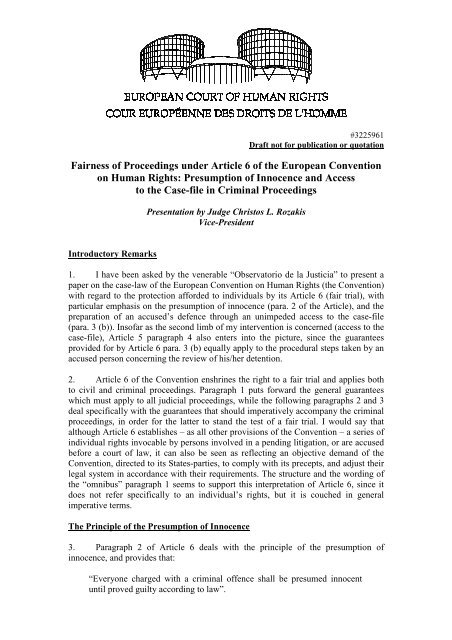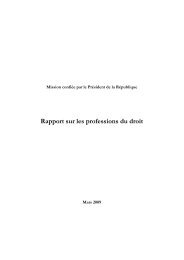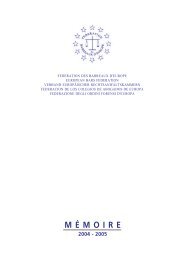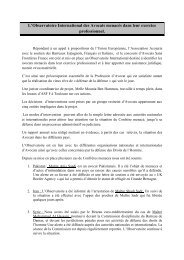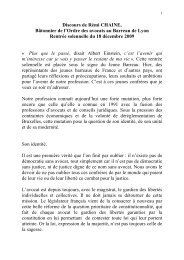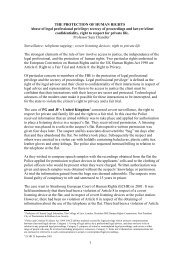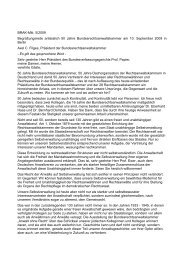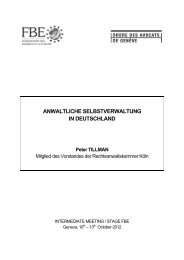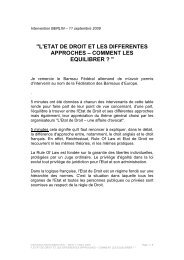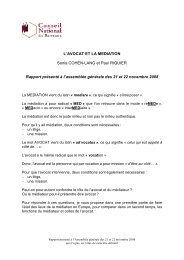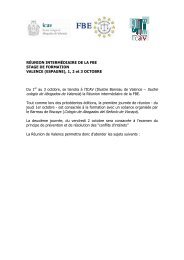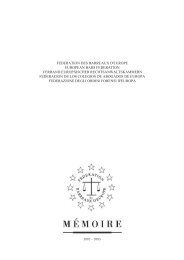Judge Christos Rozakis
Judge Christos Rozakis
Judge Christos Rozakis
You also want an ePaper? Increase the reach of your titles
YUMPU automatically turns print PDFs into web optimized ePapers that Google loves.
#3225961<br />
Draft not for publication or quotation<br />
Fairness of Proceedings under Article 6 of the European Convention<br />
on Human Rights: Presumption of Innocence and Access<br />
to the Case-file in Criminal Proceedings<br />
Introductory Remarks<br />
Presentation by <strong>Judge</strong> <strong>Christos</strong> L. <strong>Rozakis</strong><br />
Vice-President<br />
1. I have been asked by the venerable “Observatorio de la Justicia” to present a<br />
paper on the case-law of the European Convention on Human Rights (the Convention)<br />
with regard to the protection afforded to individuals by its Article 6 (fair trial), with<br />
particular emphasis on the presumption of innocence (para. 2 of the Article), and the<br />
preparation of an accused’s defence through an unimpeded access to the case-file<br />
(para. 3 (b)). Insofar as the second limb of my intervention is concerned (access to the<br />
case-file), Article 5 paragraph 4 also enters into the picture, since the guarantees<br />
provided for by Article 6 para. 3 (b) equally apply to the procedural steps taken by an<br />
accused person concerning the review of his/her detention.<br />
2. Article 6 of the Convention enshrines the right to a fair trial and applies both<br />
to civil and criminal proceedings. Paragraph 1 puts forward the general guarantees<br />
which must apply to all judicial proceedings, while the following paragraphs 2 and 3<br />
deal specifically with the guarantees that should imperatively accompany the criminal<br />
proceedings, in order for the latter to stand the test of a fair trial. I would say that<br />
although Article 6 establishes – as all other provisions of the Convention – a series of<br />
individual rights invocable by persons involved in a pending litigation, or are accused<br />
before a court of law, it can also be seen as reflecting an objective demand of the<br />
Convention, directed to its States-parties, to comply with its precepts, and adjust their<br />
legal system in accordance with their requirements. The structure and the wording of<br />
the “omnibus” paragraph 1 seems to support this interpretation of Article 6, since it<br />
does not refer specifically to an individual’s rights, but it is couched in general<br />
imperative terms.<br />
The Principle of the Presumption of Innocence<br />
3. Paragraph 2 of Article 6 deals with the principle of the presumption of<br />
innocence, and provides that:<br />
“Everyone charged with a criminal offence shall be presumed innocent<br />
until proved guilty according to law”.
- 2 -<br />
The principle of presumption of innocence, which, of course, is not a novel invention<br />
of the Convention’s drafters but can be met in almost all the developed legal systems<br />
of the world, reflects another well-known principle of criminal law, namely that a<br />
person charged with a criminal offence is entitled to the benefit of doubt (the in dubio<br />
pro reo principle) until the moment that through a procedure established by law is<br />
found to be guilty. In other words, the mere suspicion that someone has committed a<br />
criminal offence cannot justify either a pronouncement of guilt, or the taking of<br />
criminal or disciplinary measures which should only apply in the event that the<br />
criminal responsibility or a person has been unequivocally established through a<br />
procedure provided by law.<br />
4. The case-law of the Strasbourg organs (the European Commission of Human<br />
Rights and the “old” Court, before November 1998, and solely the “new” Court, after<br />
the coming into force of Protocol 11, on the 1 st November 1998) has developed<br />
detailed answers on the applicability of the principle and the conditions determining<br />
it. Let me refer succinctly to the main ones:<br />
4.1 The principle applies, basically, when a criminal charge has already<br />
been pronounced against an individual (Fatullayev v. Azerbaijan (2010) ; Orr<br />
v. Norway (2008). The applicability of paragraph 2 of Article 6 follows, in this<br />
sense, the more general pattern of Article 6, which only applies when a<br />
determination of criminal charge is at stake. In other words, the guarantees of<br />
paragraph 2 cannot be activated in cases where no criminal charge has been<br />
pronounced by the competent authorities – verbally or factually –, or where<br />
the activities of the authorities concern proceedings which, according to the<br />
Strasbourg case-law do not fall into the category of criminal proceedings (f.i.<br />
extradition proceedings, tax proceedings, etc.).<br />
Yet the Strasbourg case-law has accepted that in situations of extradition<br />
proceedings, which, as a matter of principle Article 6 does not apply, still, if<br />
statements of public officials (made because of these proceedings) were linked<br />
to a criminal investigation abroad (which had led to a request for the<br />
extradition), Article 6 para. 2 is applicable. In the case of Zollmann v. U.K.<br />
(2003), the Court did not confine itself to the finding that no real criminal<br />
proceedings were pending against the applicant in the United Kingdom, but it<br />
went on to examine whether the statements of a State official – which<br />
allegedly violated the presumption of innocence – were linked to any criminal<br />
investigations instituted against the applicant abroad. Equally in the case of<br />
Ismoilov and Others v. Russia (2008) the Court, having to deal with a<br />
statement of a Russian prosecutor, who in extradition proceedings had<br />
unambiguously stated that the applicants had “committed” certain criminal<br />
offences in Uzbekistan, found a violation of Article 6, since the “extradition<br />
proceedings were … a direct consequence… of the criminal investigation<br />
pending against the applicant in Uzbekistan. The Court therefore [considered]<br />
that there was a close link between the criminal proceedings in Uzbekistan and<br />
the extradition proceedings justifying the extension of the scope of the<br />
application of Article 6 § 2 to the latter”.<br />
4.2 From the moment that a criminal charge has been pronounced,<br />
paragraph 2 becomes applicable. It consequently applies already at the initial,<br />
pre-trial stages of the criminal proceedings (e.g. the stage of investigation)<br />
(Krause v. Switzerland (dec.), 1978), and also concerns States authorities<br />
which are not necessarily judicial authorities (f.i. police agents, members of<br />
the executive or legislative power, etc.). In the case of Butkevicius v. Lithuania
- 3 -<br />
the Court has found violations of the presumption of innocence, because the<br />
chairman of the Lithuanian parliament publicly declared guilty a government<br />
minister who had been charged with a criminal offence, but not, yet,<br />
convicted. In the same vein, a violation was found in a case (Allenet de<br />
Ribemont v. France (1995)) where a governmental official and the policemen<br />
in charge of a criminal investigation declared a suspect guilty prior to any<br />
charges having been found against him. The Court in the latter case took into<br />
account the fact that although no formal charges were at the time pronounced<br />
against the applicant, still his personal situation had been already affected by<br />
the investigations, and, of course, by the declarations of the public officials<br />
(see, also, Y.B. and Others v. Turkey, (2004)).<br />
4.3 Finding a violation of the presumption of innocence is still not limited<br />
to situations where a public authority has declared someone guilty before a<br />
determination of the guilt by a competent judicial authority. In some instances<br />
the Court has found that a problem may arise under paragraph 2 of Article 6 in<br />
cases that the press and more generally the media, had been involved in<br />
pending criminal procedure and declared, directly or indirectly, the guilt of an<br />
accused person where the case was still sub judice (Craxi n° 3 v. Italy (dec.),<br />
2001). Although no State authorities were responsible in these situations, the<br />
idea underlying the Court’s approach seems to be that the State did nothing to<br />
prevent publication of these declarations, and tolerated them. A matter which,<br />
according to the Court, could have adverse effects upon an accused person, by<br />
potentially influencing the pending judicial proceedings, and, also, traumatise,<br />
at that early stage of criminal proceedings, his/her reputation (A. v. Norway<br />
(2009).<br />
4.4 An exception to finding a violation of the presumption of innocence<br />
concerning a pre-conviction period and a pronouncement of guilt by a public<br />
prosecutor is reflected in the judgment of the Court in the case of Daktaras v.<br />
Lithuania (2000). There the Court, after having reiterated its constant position<br />
that “the presumption of innocence may be infringed not only by a judge or<br />
court but also by other public authorities, including prosecutors”, it clarified<br />
that in order for a statement of a public official to be in breach of the principle<br />
of the presumption of innocence the particular circumstances in which the<br />
impugned statement were made must be carefully considered. The Court noted<br />
that in the case before it the statements were made not in a context<br />
independent of the criminal proceedings themselves (as, f.i. in a press<br />
conference), but in the course of the preliminary stage of these proceedings<br />
and through a reasoned decision, rejecting the accused’s request to discontinue<br />
the prosecution. The Court, in this respect, noted that the prosecutor, in<br />
asserting in his decision that the accused’s guilt had been “proved” by the<br />
evidence in file used the same term as it had been used by the applicant, who<br />
in his request to discontinue the case had contended that his guilt had not been<br />
proved by the evidence in file. “While the use of the term ‘proved’”, the Court<br />
continued, “is unfortunate,… having regard to the context in which the word<br />
was used, both the applicant and the prosecutor were referring not to the<br />
question whether the applicant’s guilt had been established by the evidence…<br />
but to the question whether the case-file disclosed sufficient evidence of the<br />
applicant’s guilt to justify proceeding to trial”.<br />
Although the wisdom of that decision taken by the Court can be challenged,<br />
mainly on the basis of the argument that the prosecutor’s rejection of the<br />
accused’s request could be answered in some more mild terms (f.i. by using,
- 4 -<br />
mutatis mutandis, the very argument that the Court used, namely that the casefile<br />
disclosed sufficient evidence to justify prosecution), still the lesson which<br />
can be drawn from the judgment, as a matter of principle, is that the Court<br />
deals with the presumption of innocence on a case-to-case basis, considering<br />
the particular context, in which a statement has been made, and not only its<br />
generally incriminating content.<br />
4.5 It goes without saying that the presumption of innocence can also be<br />
violated by the court and the judges who decide on the matter of guilt, through<br />
acts produced before their final determination of a case. A public statement of<br />
a judge dealing with the case, or even the behaviour of a judge clearly<br />
indicating that the issue has been prejudged by him, suffice for the Court to<br />
find a violation (Lavents v. Latvia (2002).<br />
The Court has even gone further in some instances, when dealing with the<br />
main judicial proceedings. In the case of Telfner v. Austria (2001), the Court<br />
has found a violation where a domestic court had convicted a person on a basis<br />
of very weak evidence and speculation about his involvement in a car<br />
accident. Equally, it did so where a State imposed punitive fines on the heirs to<br />
the estates of individuals who had been found guilty of tax evasion, holding<br />
that criminal liability could not be transferred to innocent parties (A.P., M.P.<br />
and T.P. v. Switzerland (1997) ; See, also, Krumpholz v. Austria, 18 March<br />
2010, where the Court found a violation on the merits of the case, because a<br />
presumption of guilt applied by the national court).<br />
4.6 Once a person has been definitively exonerated from criminal liability<br />
– regardless of the mode of the exoneration – no authority can be justified to<br />
raise an issue of his culpability for the same facts for which that person has<br />
been exonerated. In certain instances the Court has found that Article 6 para. 2<br />
is applicable to judicial decisions taken following an acquittal of an accused<br />
person (e.g. the judgment in Sekanina v. Austria (1993), Asan Rushiti v.<br />
Austria (2000), and Lamanna v. Austria (2001)) concerned proceedings which<br />
related to an accused’s obligation to bear court costs and prosecution expenses<br />
after the end of the trial; or compensation for detention on remand, and which<br />
were found to constitute a consequence of the substantive criminal<br />
proceedings). The Court has found violations in a number of cases: in the Asan<br />
Rushiti judgment the Court emphasised that Article 6 para. 2 embodies a<br />
general rule that, following a final acquittal, “even the voicing of suspicions<br />
regarding an accused’s innocence is not longer admissible”. Also in the case of<br />
Tendam v. Spain (2010 not yet final), where the applicant had asked the<br />
national authorities for compensation for undue detention and for nonrestitution<br />
of certain seized possessions. The Minister of Justice, in his<br />
decision on the matter, rejected his request, on the basis that the applicant was<br />
acquitted because of the absence of sufficient evidence and not because of a<br />
sufficiently established evidence that he had not committed the incriminating<br />
acts. The Court, reiterating its past case law on the matter (Rushiti,<br />
Stavropoulos v. Greece (2007)), noted that an acquittal cannot be<br />
distinguished between an acquittal based on the benefit of doubt and an<br />
acquittal based on the inexistence of incriminating facts; in all situations where<br />
a court exonerates, in a definitive way, an accused person, that person is<br />
considered innocent, and not authority can further dispute it; unless new facts<br />
are presented, at a stage posterior to a judgment, justifying the reopening of<br />
criminal proceedings.
- 5 -<br />
The same rationale also applies to a situation where criminal proceedings have<br />
been discontinued. In the case of Capeau v. Belgium (2003), criminal<br />
proceedings against the applicant had been discontinued at the pre-trail stage,<br />
and the accused person had asked the Appeals Board to award him<br />
compensation for his detention. The Appeals Board refused the request on the<br />
fact that the applicant had not supported his compensation claim by adducing<br />
evidence of his innocence. Although the Court accepted in this case that the<br />
voicing of suspicions regarding an accused’s innocence is conceivable as long<br />
as the conclusion of criminal proceedings has not resulted in a decision on the<br />
merits of the accusation, and that in Belgian law a discontinuation order does<br />
not bar the reopening of a case in the event of new evidence or new<br />
developments, still, “[r]equiring a person to establish his or her innocence,<br />
which suggests that the court regards that person as guilty is unreasonable and<br />
discloses an infringement of the presumption of innocence. The Court would<br />
observe in that connection that, in criminal cases, the whole matter of the<br />
taking of evidence must be looked at in the light of Article 6 § 2 and requires,<br />
inter alia, that the burden of proof be on the prosecution”.<br />
5. From the indicative, but by no means exhaustive, presentation of the<br />
Convention’s case-law on the presumption of innocence, it clearly transpires that the<br />
principle does not apply solely or exclusively to cases that a court or a judge dealing<br />
with a criminal case expresses a conviction of guilt, before a final determination of the<br />
case. The presumption of innocence applies throughout the criminal proceedings from<br />
the moment that criminal charges have been pronounced – sometimes exceptionally,<br />
even before them – and up to the moment of a final decision (Englert v. Germany,<br />
report of the Commission (1985); Nölkenbockhoff v. Germany, report of the<br />
Commission (1985). It can equally apply to a post-acquittal period, or to a situation of<br />
discontinuation of criminal proceedings without trial, where no suspicion can continue<br />
to be raised against a person exonerated from criminal responsibility.<br />
Insofar as the ratione personae element is concerned, the presumption of<br />
innocence is not only violated by a competent court or judge, but also by those who<br />
are involved in the criminal proceedings (police, investigators, public prosecutors). In<br />
certain circumstances even statements of persons extraneous to the proceedings (such<br />
as members of the government, of the parliament, etc.) prejudging the issue of guilt<br />
can be considered as violating Article 6 para. 2. The State may be held responsible<br />
even in situations where no State authority is involved in an extrajudicial “conviction”<br />
of an accused person, either because it has not taken the necessary steps to prevent it,<br />
or because it tolerated it. In any event, the crucial test always applicable for the<br />
determination of a violation of the principle of the presumption of innocence is<br />
whether a premature pronouncement of guilt can influence (because of the source and<br />
the power of the pronouncement, the pending criminal proceedings, and/or have more<br />
general repercussions for an accused person (reputation), at a moment where he/she is<br />
still considered to be innocent.<br />
Finally, the finding of a violation of the principle cannot be established in<br />
abstracto, solely on the basis of the content of a statement which prejudges the guilt.<br />
A statement should be seen in context, taking into account all the surrounding<br />
circumstances which has led to its publication.
- 6 -<br />
Access to the case-file as part of the right of an accused person to prepare his/her<br />
defence<br />
6. The right of the defence of an accused person in criminal proceedings to have<br />
access to the case-file is part of the more general guarantee provided for by<br />
paragraph 3 (b) of Article 6 (read in conjunction with alinea (c) of the same<br />
paragraph), which provide:<br />
“3. Everyone charged with a criminal offence has the following minimum<br />
rights:<br />
…<br />
(b) to have adequate time and facilities for the preparation of his<br />
defence;<br />
(c) to defend himself in person or through legal assistance of his<br />
own choosing or, if he has not sufficient means to pay for legal<br />
assistance, to be given it free when the interests of justice so<br />
require.”<br />
The case-law of the Convention has constantly linked the guarantees of<br />
paragraph 1 of 3 of Article 6 with the more general guarantees of paragraph 1 of the<br />
same article (Artico v. Italy (1980) and more particularly with the principle of equality<br />
of arms, which is considered to be one of the fundamental precepts determining a fair<br />
trial. According to the case-law the principle of equality of arms suggests that each<br />
party in a pending (criminal) case must be afforded a reasonable opportunity to<br />
present his/her case under conditions that do not place him/her at a disadvantage visà-vis<br />
his/her opponent.<br />
“In this context importance is attached to appearances as well as to the increased<br />
sensitivity to the fair administration of justice” (Bulut v. Austria, 1996). As the Court<br />
has noted in the Öcalan v. Turkey (2005) case “[t]he principle of the equality of arms<br />
is only one feature of the wider concept of a fair trial, which also includes the<br />
fundamental right that criminal proceedings should be adversarial. The right to an<br />
adversarial trial means, in a criminal case, that both prosecution and defence must be<br />
given the opportunity to have knowledge of and comment on the observations filed<br />
and the evidence adduced by the other party. However, whatever method is chosen, it<br />
should ensure that the other party will be aware that observations have been filed and<br />
will get a real opportunity to comment on them”.<br />
The court has also considered that “respect for the rights of the defence requires that<br />
limitations on access by an accused or his lawyer to the court file must not prevent the<br />
evidence being made available to the accused before the trial and the accused being<br />
given an opportunity to comment on it through his lawyer in oral submissions.”<br />
(Öcalan v. Turkey, 2005).<br />
7. The issues which should be examined in the present analysis are the following:<br />
first, at what stage of the proceedings the right provided for by Article 6 para. 3 (b)<br />
must be activated; second, in case that an accused person is represented by a lawyer,<br />
does the right of access to the case-file apply equally both to his/her lawyer and to<br />
himself/herself; third, is the right of access absolute or it can be limited in certain<br />
circumstances; finally does this right apply to cases of pre-trial detention proceedings<br />
covered by Article 5 of the Convention?<br />
8. To answer the first question: the right of access to a criminal case-file<br />
inevitably is activated from the moment that a criminal charge is pronounced. In real
- 7 -<br />
terms the right is activated from the moment that a file is constituted and contains<br />
elements which are useful for the preparation of the defence of an accused person (f.i.<br />
the bill of indictment) (Imbrioscia v. Switzerland (1993). The term “defence” does not<br />
only refer to the defence before the court in the main trial, but also concerns defence<br />
in the wider context of the criminal proceedings instituted against an accused person,<br />
including steps prior to the main trial (f.i. instruction period). If an accused person<br />
remains uninformed throughout the period of the pre-trial proceedings, then the risk is<br />
that that lack of information at that crucial stage may have serious repercussions on<br />
his/her defence before the court in his/her main trial.<br />
9. To answer the second question: In this respect we should distinguish between<br />
a situation where an accused person is represented by a lawyer in the criminal<br />
proceedings, and a situation where the accused person defends himself/herself alone,<br />
having had the right, in accordance with the national law, to do so.<br />
In the first eventuality the case-law of the Court starts from the assumption that<br />
Article 6 provides, in principle, for individual rights which can be exercised by an<br />
accused person himself/herself; and that, as a consequence, the latter person should be<br />
guaranteed an effective participation in a criminal trial. “The concept of ‘effective<br />
participation’ in a criminal case includes the right to compile notes in order to<br />
facilitate the conduct of the defence, irrespective of whether or not the accused is<br />
represented by counsel. Indeed, the defence of the accused’s interests may best be<br />
served by the contribution which the accused makes to his lawyer’s conduct of the<br />
case before the accused is called to give evidence” (Matyjec v. Poland, Pullicino v.<br />
Malta, 2000). So as a matter of principle, an accused person should have in his/her<br />
hands all the necessary information in order to prepare his/her defence in an adequate<br />
manner, and under conditions safeguarding the equality of arms.<br />
Yet, the Court’s case-law has accepted that the guarantees of Article 6 on the<br />
matter can be satisfied if an accused person has the necessary information concerning<br />
his/her criminal file even in situations the accused person has not direct access but<br />
he/she is duly informed on the content of the file through the initiative of his/her<br />
lawyer, who had direct access to it.<br />
Still the condition which must be satisfied in both situations (direct or indirect access<br />
to information) is that the accused person must have adequate time for the preparation<br />
of his/her defence; which means that access to the necessary information must come<br />
in time, allowing the accused and his/her representatives to prepare adequately their<br />
defence. In the case of Kremzow v. Austria the Court did not find a violation of<br />
Article 6, because the applicant had twenty-one days in which to examine a case file<br />
of forty-nine pages; in contrast, in the Öcalan case, the applicant had only twenty<br />
days in which to examine a case file containing 17,000 pages. Insofar as the<br />
applicant’s lawyers’ access to file, the Grand Chamber of the Court agreed with the<br />
finding of the Chamber and its reasoning in concluding to a violation of Article 6:<br />
“… the applicant’s lawyers received a 17,000-page file approximately two<br />
weeks before the trial… since the restriction imposed on the number and<br />
length of their visits made it impossible for the applicant’s lawyers to<br />
communicate the documents in the file to their client before 2 June 1999<br />
or to involve him in its examination and analysis, they found themselves a<br />
situation that made the preparation of the defence case particularly<br />
difficult. Subsequent developments of the proceedings did not permit them<br />
to overcome these difficulties: the trial proceeded apace…”.
- 8 -<br />
11. While the Court has accepted, in a pragmatic way, that the Convention’s<br />
requirement to access to the case-file can be satisfied if the lawyers have the<br />
possibility to consult it, and to convey to an accused person the necessary information,<br />
allowing thus an effective preparation of the defence, direct access is a precondition<br />
of conformity with the Convention in circumstances where an accused person is not<br />
represented by a lawyer (Foucher v. France, 1997). Indeed, from the moment that a<br />
national system allows individuals to represent themselves personally in criminal<br />
proceedings, without legal assistance, it would be unreasonable not to give them, at<br />
the same time, the capacity to defend themselves effectively, by consulting the<br />
relevant criminal case-file. Still in the case of Menet v. France (2005) the Court has<br />
expressed some hesitations as to the general applicability of the above mentioned<br />
principle – concerning unrepresented individuals – by referring to the difference<br />
between lawyers and private persons, insofar as access to the case-file is concerned:<br />
the Court considered that while in the French legal system a lawyer has an obligation<br />
of professional secrecy and cannot, therefore, disclose information of the case file<br />
which must remain confidential, a private person is not obliged to do so. Such a<br />
difference may justify a different treatment of an individual insofar as access to<br />
information is concerned. Yet, the Court did not conclude, in that case, that that<br />
ground justified the finding of non-violation, it reached a non-violation conclusion on<br />
another ground, namely in the circumstances of the case the applicant was not an<br />
accused person (against whom criminal charges were pending), but a “partie civile”.<br />
A reason which by itself justified a different treatment of the case.<br />
12. The third question which should be answered is whether the right to access to<br />
the case-file can be restricted in certain circumstances. The answer is that the Court<br />
has not altogether excluded that there may be circumstances where access cannot be<br />
allowed; yet the rule is that “unrestricted access to the case-file and unrestricted use of<br />
any notes, including, if necessary, the possibility of obtaining copies of relevant<br />
documents were important guarantees of a fair trial…” (Matyjek v. Poland). In the<br />
case of Moiseyev v. Russia (2009) the Court accepted that “national security<br />
considerations may, in certain circumstances, call for procedural restrictions to be<br />
imposed in the case involving state secrets”. Nevertheless, “even where national<br />
security is at stake, the concepts of lawfulness and the rule of law in a democratic<br />
society require that measures affecting fundamental rights, such as the right to a fair<br />
trial, should have a lawful basis and should be appropriate to achieve their protective<br />
function”. One can easily conclude from these lines that the Court does not exclude<br />
restrictions on access to a file, provided that these restrictions serve a serious purpose,<br />
protecting fundamental State rights or interests, and are established by law; and, as the<br />
Court has also determined in the same case, the State must always carefully consider<br />
alternative possibilities to allow for the consultation of the case-file, excluding f.i.<br />
those documents or parts of the case-file which were considered to be sensitive to<br />
national security, but allowing the examination of the “innocuous” parts of the file by<br />
the accused person.<br />
13. The last question to be answered is whether the right of access to information<br />
applies equally to proceedings envisaged by Article 5, and more particularly by its<br />
paragraph 4 (judicial proceedings concerning review of a detention).<br />
The case-law of the Court seems clear, on the matter. As Gomien says (Short guide<br />
to the European Convention on Human Rights, Strasbourg: Council of Europe<br />
Publishing, 2000), “[t]he judicial bodies reviewing claims to deprivation of liberty<br />
must be independent and guarantee procedural safeguards of a judicial character (for<br />
example access to court, legal representation in some instances, and sufficient<br />
information about the grounds for detention to be able to mount an effective
- 9 -<br />
challenge).” (see also Toth v. Austria (1991); Chahal v. the United Kingdom (1996).<br />
The Court has repeatedly held that the principle of equality of arms applies to habeas<br />
corpus proceedings: “in this light, an accused must have access to the files used by the<br />
investigating authorities in their review of a decision to detain the accused on remand<br />
(Lamy v. Belgium, 1989), and must be provided with any submissions in this regard<br />
made by the prosecuting authorities (Niedbala v. Poland, 2000). I would add that<br />
comparable guarantees are, mutatis mutandis, applicable to the factual situations<br />
envisaged by article 5 paragraph 3: although admittedly at that stage, the case-file is<br />
usually meagre (see Brannigan and McBride v. the United Kingdom (1993).<br />
Concluding Remarks<br />
14. It clearly transpires from the preceding analysis that the Court’s case-law<br />
attributes particular importance to guaranteeing respect of the procedural requirements<br />
of Article 6, and, hence, the fairness of criminal trials. The Court’s expansive<br />
interpretation of paragraph 2 (through which the principle can be adversely affected<br />
by acts of a court dealing in concreto with a criminal case, but also encompasses acts,<br />
of “peripheral” actors, even non-State actors), and paragraph 3 (b), where the general<br />
terms of the relevant alinea has taken important jurisprudential dimensions covering<br />
in a detailed manner the extent of the procedural safeguards (and including also<br />
proceedings under Article 5), indicates the importance that the Court attaches to these<br />
procedural guarantees, which are closely linked, as the Court has many times<br />
reiterated, with the general guarantees provided for by Article 6, paragraph 1 of the<br />
Convention.


